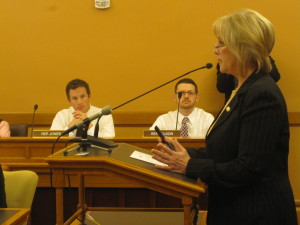Navigator bill in KS treads line between protections and government bloat

CONSUMER ADVOCATE: State Sen. Mary Pilcher-Cook paints her legislation as a way to fill in the gaps regarding federal regulation of Obamacare Navigators to protect Kansans.
By Travis Perry │ Kansas Watchdog
OSAWATOMIE, Kan. — Somewhere between protecting consumers and growing government bloat is state Sen. Mary Pilcher-Cook’s bill, SB 362.
The legislation is either a shield for insurance-seeking Kansans or an array of duplicative state regulations, depending who you ask.
Here are the broad strokes: The bill submitted by Pilcher-Cook, R-Shawnee, would establish registration and renewal procedures for would-be insurance navigators with a $100 annual fee. Navigators could not only be fingerprinted, but would also go through a criminal background check for felony convictions, as well as any misdemeanors involving fraud and dishonesty.
The Kansas Attorney General’s office would be directed to establish an online database of all Obamacare navigators working in the Sunflower State. Also, among other restrictions, navigators would be forbidden from pitching one health care plan over another.
“There are things that make sense. This bill does not,” said Cathy Harding, executive director of the Kansas Association for the Medically Underserved. “It goes way too far. We can do something different that will not grow government and add additional costs to the state.”
Harding and an array of other professionals representing health safety net clinics and organizations across the state continued to sound the alarm before members of the House Health and Human Services Committee on Wednesday after Pilcher-Cook’s bill sailed through the Senate 30-10 on March 12.
Opponents argue the legislation would duplicate existing federal restrictions and requirements training navigators on managing confidential data. Additionally, all 168 Kansas navigators have undergone voluntary criminal felony background checks.
“Nothing is in the bill that isn’t already happening, except for the fees that would be applied to us, and the Attorney General’s involvement,” navigator Jordan Rickabaugh stated.
Pilcher-Cook fired back, arguing that federal protections don’t go far enough.
“What this bill does is fill in the gaps,” Pilcher-Cook said, referring to increased oversight, registration and prosecutorial permissions granted to the AGs office, as well as misdemeanor background checks.
The senator cited examples where navigators have encouraged consumers to lie on their applications, as well as an Illinois navigator who had ties to a terrorist organization. Pilcher-Cook asserted the legislation wasn’t in response to any one individual — namely, Rosilyn Wells.
If that name seems familiar, it’s because Wells made headlines last fall after the Daily Caller outed the Lawrence navigator for having a bench warrant out for her arrest for unpaid medical bills, as well as a 2003 bankruptcy and a 2007 civil charge from Midwest Checkrite. Wells has since settled her legal issues.
Despite her claims that Wells wasn’t the focus of the bill, Pilcher-Cook originally pledged to introduce the legislation only days after the Daily Caller published its findings on Wells. Undercover video capturing navigators encouraging consumers to lie while applying for health care coverage came out nearly a month after Pilcher-Cook’s commitment, and revelations that an Illinois navigator took part in several 1969 bombings in Israel didn’t arise until February.
Ironically, Wells’ employers, Heartland Community Health Center, previously told Kansas Watchdog that SB 362 would in no way prevent Wells from continuing to serve as a navigator.
The $100 registration fee caused significant heartburn for opponents of the bill, who said private insurance salesmen aren’t subjected to similar measures. In Kansas, insurance salesmen are only required to pay $30 one time to establish licensure.
But Pilcher-Cook pointed to the roughly $400 that such individuals must spend annually to buy omissions and errors insurance, as well as the $300 or more they spend on continuing education credits every two years.
“Yes, I think the application fee is reasonable,” she noted.
A key factor pushing the legislation is the notion that navigators could leak private information. So, you may be wondering, just what kind of information is that?
Rickabaugh said navigators have access to an individual’s full name, address, phone number, date of birth, Social Security number, current insurance information and whether they are a smoker.
That’s it.
“Not only (does) every utility company in the state (collect this) … you’re also going to have to think about anybody who collects information at a Kohls or Sears for a store credit card,” argued Sean Gatewood, interim executive director of the Kansas Health Consumer Coalition. “To me, there’s no danger over and above what the consumer is already taking through ordinary life. Actually, it would be much safer because the navigators are getting rid of that information.”
Committee chairman Rep. Dave Crum, R-Augusta, said committee members would continue to work the legislation Thursday.
Related: Kansas considers tighter grip on Obamacare navigators
Related: Kansas lawmaker calls for crackdown on Obamacare navigators
Related: Obamacare navigator under fire for arrest warrant
Contact Travis Perry at travis@kansaswatchdog.org, or follow him on Twitter at @muckraker62. Like Watchdog.org? Click HERE to get breaking news alerts in YOUR state!
The post Navigator bill in KS treads line between protections and government bloat appeared first on Watchdog.org.







